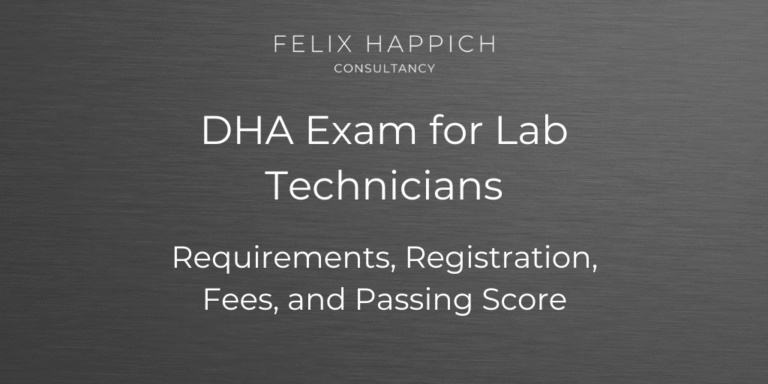Dubai is one of the world’s leading healthcare destinations for medical professionals because of its growing medical tourism industry, advanced healthcare infrastructure, competitive salaries, and strong opportunities for professional growth. The city’s high standard of healthcare attracts patients from across the globe, increasing the demand for skilled healthcare workers. Nurses are among the most needed professionals in Dubai’s expanding healthcare network. For example, the number of nurses and midwives in Dubai rose from 16,246 in 2019 to 22,960 in 2023, with the greatest demand in intensive care (ICU), oncology, and pediatric nursing, according to the Dubai Health Authority (DHA).
To join this healthcare community, nurses must go through the DHA licensing process, which involves self-assessment, passing computer-based tests, and obtaining a DHA medical license. For newcomers, the process may take two to three months, while those with prior experience or guidance from a consultant can often complete it in one to two months.
Once licensed and employed, nurses receive benefits that may include a basic salary, housing and transportation allowances, and overtime pay. Salaries for new graduates typically range from AED 4,000 to AED 7,000 per month, while experienced and specialized nurses can earn from AED 5,000 to over AED 28,000. Compensation packages often include health insurance and paid leave.
Although nurses in Dubai enjoy advantages such as a high quality of life, safe communities, and a family-friendly education system, they may also face challenges such as licensing delays and adapting to a multicultural work environment. This guide outlines the requirements, job opportunities, earning potential, and common challenges for nurses in Dubai.
Requirements for Working as a Nurse in Dubai
According to the DHA, the requirements for working as a nurse in Dubai include a bachelor’s degree in nursing, at least two years of clinical experience, a DHA medical license for nurses, Primary Source Verification of documents through DataFlow, an English Proficiency Certificate, a passing certificate from the DHA Prometric Exam, and a medical fitness certificate.
Full list of requirements:
- Bachelor’s degree in nursing of at least three years from an accredited medical institution
- Minimum of a clinical internship plus two years of clinical experience after the internship
- Valid DHA medical license for nurses
- Primary Source Verification of educational and professional documents through DataFlow
- Good Standing Certificate (GSC) issued by the relevant authority in your home country
- English Language Proficiency Certificate issued within the past six months
- Passing the certificate from the DHA Prometric exam or an eligibility certificate for the DHA medical license
- Medical fitness certificate from a DHA-licensed medical facility
- Sponsorship proof from the employing facility
DHA License Process for Nurses in Dubai
The DHA nursing licensing process involves self-assessment, Primary Source Verification of documents, passing a Computer-Based Test (CBT), registration on the DHA Sheryan portal, submitting the application for a DHA nursing license, and activation of the license.
Key steps in the licensing process:
- Self-Assessment – Check eligibility using the self-assessment tool on the DHA website
- Primary Source Verification – Begin the verification of all educational and professional documents once eligibility is confirmed
- Prometric Medical Exam – Pass the computer-based test, which includes multiple-choice questions to assess medical knowledge and clinical skills
- Application and Fees – Complete the online application form on the DHA Sheryan portal and pay the license fees
- License Issuance – Once approved, the DHA license is issued within a few days and can be downloaded from the Sheryan portal
Opportunities for Nursing professionals in Dubai
Nursing roles in Dubai can be found in public hospitals, private clinics, specialty care centers, home healthcare services, schools, and facilities serving medical tourism. The demand for nurses is rising, with the UAE expected to need more than 33,000 registered nurses by 2030, over 40 percent of whom will work in Dubai.
Common nursing positions in Dubai include:
- Registered Nurse (RN)
- Assistant Nurse / Practical Nurse
- Home Care Nurse
- ICU Nurse
- Emergency Room (ER) Nurse
- Operating Room (OR) / Theater Nurse
- Pediatric Nurse
- Maternity / Obstetrics & Gynecology (OB-GYN) Nurse
- School Nurse
- Clinical Nurse Specialist (CNS)
- Nurse Practitioner (NP)
- Dialysis Nurse
- Oncology Nurse
- Cardiac Care Nurse
- Community Health Nurse
- Mental Health / Psychiatric Nurse
- Infection Control Nurse
- Nursing Supervisor / Charge Nurse
- Case Manager Nurse
- Medical-Surgical Nurse
Nursing Specialties in Highest Demand
The most in-demand nursing specialties in Dubai are ICU, pediatric, oncology, emergency room, and mental health nursing. The demand for oncology nurses is expected to grow significantly, with cancer cases in the UAE projected to rise by up to 230 percent by 2040, according to the International Agency for Research on Cancer (IARC).
High-demand specialties include:
- ICU / Critical Care Nurse
- Emergency Room (ER) Nurse
- Pediatric Nurse
- Oncology Nurse
- Cardiac Care Nurse
- Dialysis Nurse
- Neonatal Nurse (NICU)
- Mental Health Nurse
- Home Care Nurse
- School Nurse
- Infection Control Nurse
- Community Health Nurse
How to Search for a Nursing Job in Dubai
Nurses can find jobs through hospital career portals, government job portals, recruitment agencies, online job boards, and professional networks. It is important to review eligibility criteria before applying and to understand each employer’s application process.
Sources for nursing jobs in Dubai include:
- Healthcare group portals – DHA, Mediclinic Middle East, Aster DM Healthcare, NMC Healthcare, Saudi German Hospital Dubai
- Government job portals – Mohre.gov.ae, Dubai Careers Portal
- Specialized recruitment agencies – Dynamic Health Staff, Medacs Healthcare, JPR Healthcare Recruitment, First Medical Consultancy, Envolve Recruitment
- Online job boards – Indeed UAE, Naukrigulf, Bayt.com, LinkedIn Jobs
- Walk-in interviews and career fairs – often organized by leading hospitals and health departments
- Professional networking platforms – LinkedIn groups, Facebook communities, WhatsApp job alert groups
Mistakes to Avoid When Applying
Common mistakes that can harm job prospects include misreporting experience, submitting poor-quality or incomplete documents, ignoring eligibility criteria, applying without a valid DHA license, and failing to prepare for interviews.
Details on common mistakes:
- Misreporting experience – Detected through DataFlow verification, leading to rejection
- Poor document submission – Blurry scans, missing translations, or incorrect formats can delay or prevent processing
- Ignoring eligibility requirements – Each nursing role has specific requirements for education, experience, and licensing
- Applying without a DHA license – All facilities require a valid DHA license before considering an application
Where to Check Nursing Vacancies
Nursing vacancies are regularly posted on job portals such as Indeed, LinkedIn, and Naukri Gulf. Clinics and hospitals also post vacancies on their official websites, and recruitment agencies like Visa Live and Metac Clinic Middle East advertise nursing positions.
Nurse Salary in Dubai
Nurse salaries in Dubai range from AED 5,000 to AED 28,000 per month, depending on experience, qualifications, specialty, and employer type.
By sector:
- Private sector: AED 4,500 to AED 15,000
- Public sector: AED 9,000 to AED 14,000
Salary Components and Benefits
Salary components: basic salary, housing allowance, transportation allowance, gross salary, and overtime pay.
Benefits: health insurance, paid annual leave, sick leave, maternity leave, airfare, accommodation allowance, and licensing fees.
Lifestyle for Nurses in Dubai
Dubai offers a tax-free salary, modern infrastructure, and a safe environment for families. However, some nurses find it difficult to maintain this lifestyle because of the high cost of living.
Cost of living:
- With employer-provided housing: AED 2,400 to AED 3,850 per month
- Without housing allowance: AED 5,500 to AED 8,500 per month
This includes rent (AED 3,000 to 5,000), transport (AED 300 to 600), food (AED 1,200 to 1,800), and utilities (AED 400 to 600).
Education for children:
Dubai’s schools offer American, British, Indian, and International Baccalaureate curricula. Annual fees range from AED 10,000 to AED 40,000, with some schools offering installment payment options.
Social life:
Nurses typically work eight to twelve hours per day and spend their free time with family, exercising, or enjoying leisure activities. Popular options include Zumba, yoga, walking clubs, dining out, shopping malls, and beaches.
Popular residential areas for nurses:
Al Nahda, Deira, Karama, Bur Dubai, and Muhaisnah.
Challenges while working as a Nurse in Dubai
Licensing delays and application errors: Missing or incorrect documentation, DataFlow issues, fee payment problems, and employer approval delays can extend processing times. Using an experienced consultancy can help.
Adapting to healthcare culture: Dubai’s system emphasises clinical accuracy, electronic medical records, and multicultural teamwork, which may require adjustment.
Managing living costs: General nurses often earn AED 5,500 to 7,500 per month, while average monthly expenses can be AED 6,600 to 7,600.
Cultural sensitivity: Nurses care for patients from a wide range of cultural and national backgrounds, which requires awareness of gender norms, religious practices, dietary restrictions, and language considerations.





